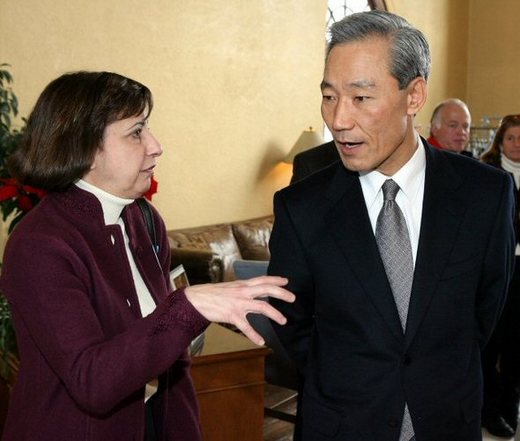Posted on : Dec.4,2006 14:55 KST
Modified on : Dec.5,2006 14:20 KST
 |
|
Top U.S. negotiator Wendy Cutler and her counterpart Kim Jong-hoon
|
With usual divisions still in place, negotiators seek to finalize textiles sector
Officials from South Korea and the U.S. resume their negotiations on a proposed free trade agreement this week in the U.S. resort city of Big Sky, Montana. Both sides have pledged to make headway in this five-day, fifth round of talks, with Seoul pushing for its demands in the areas of trade protection and textiles and Washington sticking to its stance in such areas as beef, automobiles, pharmaceuticals, as well as intellectual property rights, investment, and labor.
The U.S. chose Big Sky as the venue for the latest free trade agreement (FTA) talks, which was an inconvenient locale for South Korean negotiators, as they had to transfer planes twice to get to the small mountain resort, spending more than 24 hours in transit. The decision on the venue was reportedly influenced by Max Baucus, a Montana senator. He has applied pressure for South Korea to further open its beef market for U.S. imports; beef is Montana's flagship industry.
Beef is among the most sensitive issues for both sides. After a several-years ban on U.S. beef imports due to fears of Mad Cow Disease, the first shipment after renewing the beef deal was sent back due to the discovery of a bone fragment in the meat. U.S. beef sent to South Korea cannot contain any bone, marrow, or brain matter for fear of spreading a form of the virus to humans.
"The beef issue is not on the negotiating table, but it is one area that the U.S. is keeping a close eye on," Seoul's top trade official Kim Jong-hoon said. "The rejection of U.S. beef shipments after the discovery of a bone fragment would serve as a negative factor in the ongoing negotiations."
Both sides also deployed higher-ranking officials in charge of negotiations on textiles, a decision designed to accelerate efforts to find common ground in another of the sensitive areas in the talks. In a related move, the two countries will hold a subcommittee meeting on Friday separate from official negotiations in order to discuss the textiles issue.
"We took the action to make headway in the [textiles] area, where both sides have failed to find common ground," said Kim Jun-dong, a commerce ministry official in charge of the FTA.
South Korea will focus its efforts on the "trade remedy" sector - or trade protections such as anti-dumping and countervailing duties - during this week's FTA negotiations. Top trade official Kim once cited this area along with textiles as the two sectors where Korea has failed to make progress.
However, experts say that the negotiation environment has changed since Democrats gained the upper hand in U.S. Congress following recent mid-term elections, as Democrat-backed legislation tends to favor protection of the domestic market from international competition.
"It would not be easy to prompt the U.S. to change laws related to the trade remedy issue at a time when Congress is dominated by Democrats," a researcher at the Korea Institute for International Economic Policy said on condition of anonymity. Rather than focusing on this sector, he continued, "South Korea needs to pay more attention to the auto industry, drug pricing, beef, and the investment sector."
South Korea and the U.S. will hold subcommittee discussions on 16 out of 19 areas in the free trade talks. Separate talks on rules regarding bids for government contracts will be held in Geneva on Monday, and talks on quarantine regulations will be held December 19-20 in Washington.
Please direct questions or comments to [englishhani@hani.co.kr]

